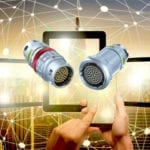The Maker Movement Encourages Tech Tinkerers to Try This at Home
As growing numbers of hobbyists and makers tinker with today’s technology, more electronics companies are meeting their makers.
By Amy Goetzman
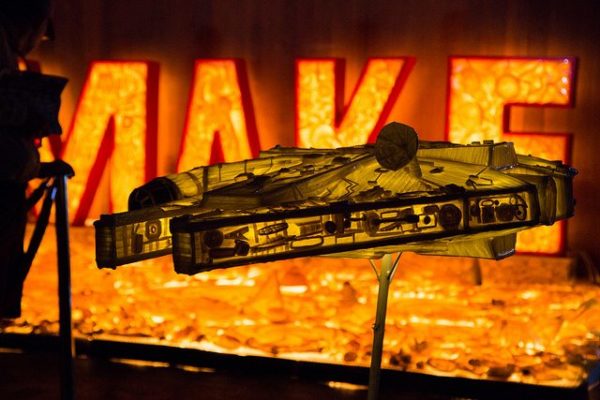
Technology is everywhere. The Internet of Things (IoT) is touching every aspect of our lives. The line between virtual reality and the real world is blurring. For most users, engagement in this evolution is limited to plugging things in and tapping icons to activate functions. For a growing subset of consumers, however, merely using technology isn’t enough. These users also want to understand how electronics work and employ their principles in original designs. This category largely centers on the large and important student market, but a growing number of hobbyists — or makers, as some like to be called — are experimenting with the unlimited design potential electronics offer the creative mind.
Electronics companies and distributors are paying attention. New offerings, from maker kits to special websites that let hobbyists buy exactly the right connector, are making it easier for consumer and educational buyers to access professional-grade parts and even the technical support they need to specify the components their designs require.
One company that has embraced the maker movement is Newark element14. As the largest distributor of Raspberry Pi in North America, the company recognized that this affordable, portable, and highly versatile single-board computer has broad appeal for hobbyists and students. These unique users also need a continuing stream of connectors, cable assemblies, and other components to fully realize the potential of the tiny platform.
The company’s forthings.io (also a Premier Farnell company) is dedicated to hobbyists and startups. It offers a user-friendly and educational interface through which users can buy Raspberry Pi, BeagleBone, micro:bit, and additional parts. The site also offers a library of projects, and if a designer has an original concept with market potential, element14 can even help with the product development process.
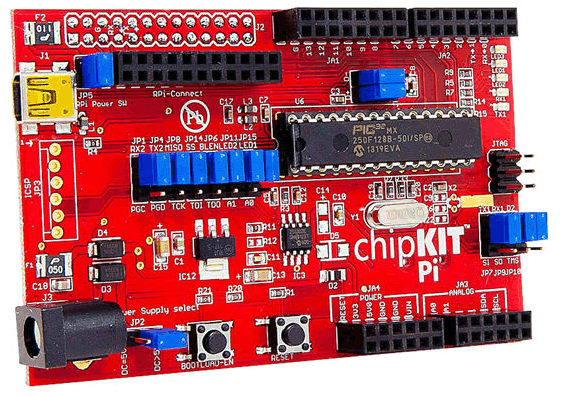
The ChipKIT Pi is one of many development kits available on forthings.io.
“As the development distributor, Newark element14 provides products and services to help makers and students design the technology of the future. We offer kits and technical support, and have a Community of Engineers where ideas can be shared and design problems solved,” said Becky McMorrow, director of North American marketing for Newark element14.
The popularity of Raspberry Pi inspired the company to expand its offerings to users who often begin with a Pi and then go on to explore other technologies.
“Our popular products [for hobbyists] include single-board computers, power supplies, connectors, and test equipment. 3D printing is another area where we’re seeing a lot of demand from our maker audience. We carry both the Lulzbot and Ultimaker lines, as well as a variety of other 3D printers,” she said, noting that the popularity of the forthings.io site is global. “We’re impressed with the level of engagement we’ve seen in the UK, Ireland, Spain, Denmark, Finland, and Sweden, and we’ll be launching in other regions soon.”
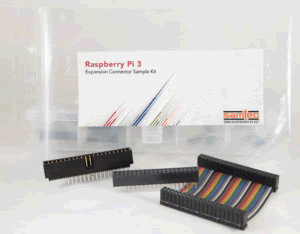
Samtec’s Raspberry Pi kit is aimed at makers.
Samtec has also embraced its maker customers. The company makes several expansion connector accessory kits that are designed for the Raspberry Pi and Arduino, BeagleBone, and ARM mbed, three other popular open-source electronics platforms. These kits are available for purchase directly from Samtec. Matt Burns, product manager at Samtec, says there isn’t a typical maker customer.
“It runs the gamut. Some are students. Some are hobbyists or tinkerers. Others are more mature customers like startups and existing customers,” he said. “Once a maker experiences Samtec’s focus on customer service, they typically come back again and again.”
The company decided to serve makers because the spirit of disruption that tinkerers represent aligns with Samtec’s own innovative drive. “Makers are disrupting the product development paradigm,” said Burns. “This forces Samtec to proactively offer its know-how, services, and solutions to a rapidly expanding customer base. Additionally, today’s makers are tomorrow’s scientists and engineers. We may be interacting with our next lead product designer!”
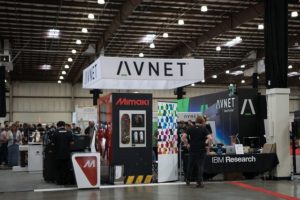
Avnet’s Maker Faire exhibit gives makers hands-on access to technology.
The connector accessory kits are a relatively new offering for the company, which introduced them at Maker Faire Bay Area 2017. Maker Faire is a traveling, global event organized by Make magazine, which serves the engineering hobbyist. It’s described as part trade show, part science fair, and provides an opportunity to see robotics, 3D printing, electric vehicles, and other creative technologies in action. The show also gives consumers the chance to examine electronic components firsthand. Many electronics companies that serve the maker market consider Maker Faires a valuable opportunity to interact with consumers who are using their products.
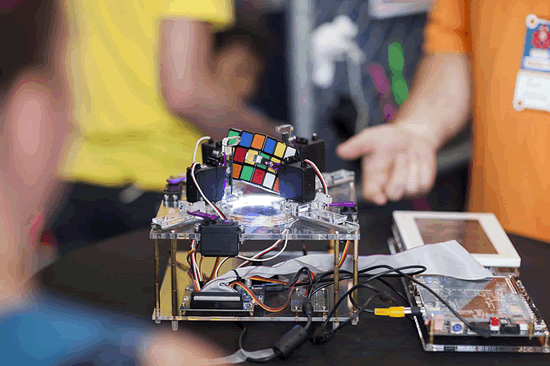
A Rubik’s Cube-solving robot at the Maker Faire Bay Area 2016.
Digi-Key, a distributor that sponsors Maker Faires, launched maker.io, a site that serves makers with tutorials, research, and products. When the hobby becomes something more, the company even offers resources that help with production, marketing, and distribution.
Mouser is another distributor that is taking hobbyists seriously. “Mouser offers all manner of products for hobbyists, makers, and education customers,” said Colin Carter, technical communications manager.
“For IoT projects, two new Arduino MKR boards provide connectivity to edge devices such as home automation sensors. Adafruit’s Itsy Bitsy 32u4 is a small development board based on the same microcontroller as the Arduino Leonardo, which means makers with experience with Arduino should be able to start working with it pretty quickly. The AAEON UP Squared Grove IoT Development Kit combines the easy-to-use Arduino integrated development environment with an onboard Intel processor. From a connector angle, this kit is based on the Seeed Grove system, which is a group of sensor and actuators with standardized connectors,” said Carter.
The company offers a wealth of educational material, including a popular Open Source Hardware site that enables consumers to compare products, access educational articles, and even follow instructions to build DIY projects, such as a desktop synthesizer and a wearable heart monitor.
Avnet has participated in Maker Faires and also supports makers through other initiatives, including Hardware Studio, an ongoing collaboration with Kickstarter and Dragon Innovation. The company’s goal is provide hardware developers — of every experience level — with the expertise they need to successfully scale and introduce products to market.
For most electronics companies, makers represent a small part of their business. However, electronics professionals more than understand the appeal of the hobby. For many, tinkering with electronics was the first step in their career. Plus, when you get quality components into the hands of students and makers, who knows what could happen? Hobbyists could very well develop the next transformative technology.
Recently posted:
[related_posts limit=”10″]
- Where in the World is Amphenol LTW’s Luc Kan? - April 23, 2024
- TE Connectivity’s Sustainability Efforts Pay Off - April 23, 2024
- What is a VGA Connector? - April 23, 2024


